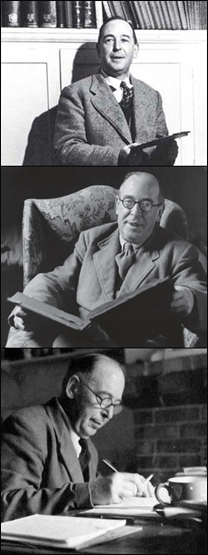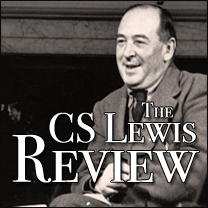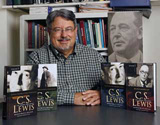
Why Isn't There a "Jewish Narnia"? — On the Nature of Fantasy & S/F
March 29th, 2010 | Skip to comments
 Here is the provocative title of a stimulating essay by Dr. Michael Weingrad: “Why There is no Jewish Narnia.”
Here is the provocative title of a stimulating essay by Dr. Michael Weingrad: “Why There is no Jewish Narnia.”
Professor Weingrad, whose article appears in the Spring, 2010 issue of the Jewish Review, directs the Jewish Studies program at Portland State University. (His book, American Hebrew Literature: Writing Jewish National Identity in the United States, will be published this fall by Syracuse University Press.)
In this compelling and erudite essay, Professor Weingrad takes notice of two recent works of imaginative fiction that both illustrate and problematize his dramatic question (The Magicians, Lev Grossman, Viking, 416 pp., $26.95; Ha-Mayim she-bein ha-olamot (trans. The Water Between the Worlds) by Hagar Yanai, Keter, 313 pp., 88 NIS; available only in Hebrew).
In contextualizing these works, he demonstrates his appreciation for the mythical worlds created by Tolkien and Lewis, while at the same time revealing his perceptive grasp of how one’s exposure to world literature and its unique genres affects both different reading cultures and the writers they produce so variously.
For instance, he believes,
“We should begin by acknowledging that the conventional trappings of fantasy, with their feudal atmosphere and rootedness in rural Europe, are not especially welcoming to Jews, who were too often at the wrong end of the medieval sword. Ever since the Crusades, Jews have had good reasons to cast doubt upon the romance of knighthood, and this is an obstacle in a genre that takes medieval chivalry as its imaginative ideal.”
At the same time, he acknowledges the imaginative allure of Narnia and Middle-Earth, both of which he read to his children:
“Tolkien and Lewis loomed large in my childhood and, as I read them to my own children, I wonder what they ought to mean to us as Jews. . . . Indeed, one wonders why, amidst all the initiatives to solve the crisis in Jewish continuity, no one has yet proposed commissioning a Jewish fantasy series that might plumb the theological depths like Lewis or at least thrill Jewish preteens with tales of Potterish derring-do. Granted, popularity is rarely cooked to order and religious allegory sometimes backfires (a mother once wrote Lewis that her nine year old son had guiltily confessed to loving Aslan the lion more than Jesus).
But still, what non-electronic phenomenon has held the attention of more children (and not a few adults) during the last ten years, than Rowling’s tales of Hogwarts? And, as Tom Shippey has shown in Tolkien: Author of the Century, the Lord of the Rings trilogy consistently tops readers’ polls of their most beloved books. Why the apparent aversion to producing such well-received books by the People of the Book?”
I am particularly struck by his generalizations about the “Christian and Jewish imaginations”:
“To put it crudely, if Christianity is a fantasy religion, then Judaism is a science fiction religion. If the former is individualistic, magical, and salvationist, the latter is collective, technical, and this-worldly. Judaism’s divine drama is connected with a specific people in a specific place within a specific history. Its halakhic core is not, I think, convincingly represented in fantasy allegory. In its rabbinic elaboration, even the messianic idea is shorn of its mythic and apocalyptic potential. Whereas fantasy grows naturally out of Christian soil, Judaism’s more adamant separation from myth and magic render classic elements of the fantasy genre undeveloped or suspect in the Jewish imaginative tradition.”
His thesis that “the messianic idea is shorn of its mythic and apocalyptic potential” when a particularist drama rather than a universal meta-narrative is at work is quite intriguing. In some ways, I find he is simply annotating Tolkien’s concept of the “eucatastrophe” (my paraphrase: the “tragedy with a happy ending”). If Professor Weingrad is right, then it helps explain somewhat why there continues to be a thirst even in a post-Christian secular culture for supernaturalist heroes and preternatural villains who enact or reenact an ancient tale deeply embedded in our souls. The conclusion seems to be that westerners tend to prefer imaginative works that convey their heroes’ exploits through what Lewis identified as “realism of presentation,” rather than by “realism of content.”
This is certainly the case in Lewis’s science fiction; “scienti-fact” is of little or no concern—as many have pointed out, we do not know how Ransom’s space transport works because he is ultimately on a mythic, not science fiction, journey. The source of oxygen and kind of propulsion that brings him to Malacandra is beside the point. (This trilogy is thus “science-fantasy,” rather than science fiction.) “The romance of knighthood,” as Professor Weingrad calls it, drives Ransom’s quest; science fiction’s specificity to time and place and commitment to scientific verisimilitude blunts the power of romance’s universalist intent.
The rest of Professor Weingrad’s article thus proceeds to document the reasons why then certain kinds of mythopoeia, as exemplified in Tolkien and Lewis, and Ursula LeGuin, may be typically absent from Jewish imaginative fiction, though finding some promise of the genesis of a tradition unfolding in the two authors he is reviewing. So I urge you to read his very compelling contextualization of how these theological issues silhouette these two contemporary writers.
But I suggest, as well, that his persuasive insights into the presence/absence of certain thematic worldview elements in a given work strike me as actually very Lewisian—and help inform the reasons why (to this reader) so much “Christian” science fiction and fantasy writing, post-Inklings, seems so stilted, derivative, lacking Sehnsucht. They have a non-organic, prosthetic aesthetic at work; something borrowed, nothing new.
It is as if a set of well-meaning cooks stumbled upon a supremely satisfying recipe, yet thinking that if they cut up the words naming its ingredients and proportions and threw them in the pot, a rich and delicious soup would emerge. But, Lewis reminds—“it all begins with an image,” not a sermon.
From War of the Worlds to Star Trek and beyond, science fiction is hardly ever predictive, but always extrapolative: outside-in; what would the world be like if certain trends and tendencies continue unabated, and what kind of man or woman would it make of us?
By contrast, fantasy strikes me as neither predictive, nor extrapolative; rather, it is inside-out. What would the world be like if certain ancient truths, eternal virtues, rumors of angels re-emerged and compelled our allegiance; what kind of man or woman would it make of us? What if? and Why not? Two different cascading sets of questions, genres, denouements lurk behind them. Myth and Science answer them differently.
The popular alien invasion story, however, in some ways combines both sets of questions–ancient or superior civilizations and modern Terran sensibilities clash, and the very nature of humanity, its destiny before either a crowded or silent universe, form the ultimate apocalyptic questions. And James Cameron’s Pandora, like Lewis’s Malacandra and Tolkien’s Middle-Earth, permits entry points that help us entertain such questions.
The task of evoking an ancient era or reinserting an older mythology into a contemporary conversation is a daunting task. Ask any historian. But inventing an era that never was or “streaming” (to use an anachronism from the internet age) the birth and maturation of a new mythology that mirrors, while not slavishly duplicating, the old—these are far more challenging still.
Few have been as good at this as Professors Tolkien and Lewis, and we are most blessed that in their turns at bat, they sought to provide the “escape” and “recovery” that would enlighten the quotidian world we inhabit. If this is not the best of all possible worlds, is it then the best of all possible ways to the best of all possible worlds?
Fantasy and science fiction were born to grapple with this challenge, albeit outside the precincts of sacred writing. We can thank Professor Weingrad for reminding us of its strong expression in the Inklings tradition.
And we can thank God that He continues to inspire some of us to walk in their steps.




What do you mean, there’s no Jewish tradition of swordfighting adventure? Look at the lives of David and Samson! The Tanakh has lots of heroes and adventure!
Comment by Nerd42 — 6 April 2010 @ 10:04 AM
I would not disagree, but regard those stories as history, not fantasy. Professor Weingrad’s point is that there is not a fantastical tradition of fictionalized stories that embody these features in the same way that there may be a science fiction catalogue. Elsewhere on the web, commenters have been pointing out that many comic book heroes have been created and promoted by Jewish writers and publishers–like Superman, Spiderman, etc., though I would say, as well, they fit into a S/F canon more than a fantasy canon.
Comment by Bruce — 6 April 2010 @ 11:54 AM